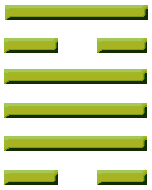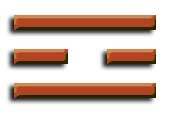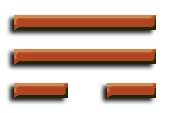
I Ching Hexagram nr. 50
|
Dǐng or Ting – Holding, the cauldron |
|
 Øverst |
Trigram: Li The Clinging, Flame |
 Nederst |
Trigram: Sun The Gentle, Wind |
Billedet:
Brand i træ: Billedet af Gryden. Således den overlegne mand konsoliderer sin skæbne ved at gøre sin stilling korrekt.
Skæbnen for brand afhænger af træ; så længe der er træ nedenfor vil ilden brænder ovenfor. Det er det samme i menneskets liv; der er i mennesket også en skæbne, der egner magt til hans liv. Og hvis han lykkes at tildele det rigtige sted til livet og til skæbnen, hvilket bringer de to i harmoni, han lægger sin skæbne på et solidt fodfæste. Disse ord indeholder hints om fremme af livet som udleveres den ved mundtlig tradition i de hemmelige lære af kinesisk yoga.
The Image
Fire over wood: The image of THE CALDRON. Thus the superior man consolidates his fate By making his position correct.
The fate of fire depends on wood; as long as there is wood below, the fire burns above. It is the same in human life; there is in man likewise a fate that lends power to his life. And if he succeeds in assigning the right place to life and to fate, thus bringing the two into harmony, he puts his fate on a firm footing. These words contain hints about fostering of life as handed on by oral tradition in the secret teachings of Chinese yoga.
I Ching helt enkeltHexagram nr. 50Hexagrammet Ting vedrører den næring og vejledning, man må have for til fulde at lykkes. Mens kulturen rundt omkring os ofte opmuntrer os til at „tage over‟ og stille aggressive krav til livet, tilbyder I Ching langt visere råd. Her opmuntres vi til at give afkald på egoets krav – til at uddybe vores ydmyghed og accept og omhyggeligt lytte til den Vises instruktioner. Billedet af karret vedrører vore indre tanker: Uanset indholdet af dit sinds „kar‟ er det dit offer til den Højere Magt. Kvaliteten af den hjælp, du kan opnå fra universet, afgøres af kvaliteten af dit offer. Giver du til stadighed efter for egoets anliggender – frygt, begær, kontrol-strategier, hårdhed over for andre – afviser du den Højere Magt og sætter proppen i for din egen næring. Men hvis du på den anden side lader din modstand mod livet falde og kun har stille og korrekte tanker, bliver du modtagelig for den Skabende, og din fortsatte ernæring sikres. Hexagrammet Ting fremkommer som en antydning af, at det viseste, du kan gøre nu, er at nedtone dit ego og samvittighedsfuldt indgå i samtale med den Vise. Dette er, hvad du må gøre, hvis du vil vinde indflydelse over andre eller opnå et ret mål. Ved at opøve ydmyghed og accept, lutre dine indre tanker og koncentrere dig om, hvad der er godt, sandt og uden skyld, tilkalder du den Skabendes kraft og mødes af en gunstig skæbne i den ydre verden. Generelt Næring af krop, sind og ånd er nøglen til en harmonisk eksistens. Kærlighed At nyde de harmoniske aspekter af dit forhold vil bidrage til at uddybe båndene mellem dig og din partner. Forretning Fokusere på de forretninger, som vil forvandle dine forhold og sørg for, at du behandler alt på en sofistikeret måde. Personligt Styrk båndene mellem dig og dem som er vigtigst for dig ved at være vært et måltid af en slags. |
| Kommentar
From the book I Ching. The six lines construct the image of Ting, THE CALDRON; at the bottom are the legs, over them the belly, then come the ears (handles), and at the top the carrying rings. At the same time, the image suggests the idea of nourishment. The ting, cast of bronze, was the vessel that held the cooked viands in the temple of the ancestors and at banquets. The heads of the family served the food from the ting into the bowls of the guests. THE WELL, likewise has the secondary meaning of giving nourishment, but rather more in relation to the people. The ting, as a utensil pertaining to a refined civilization, suggests the fostering and nourishing of able men, which redounded to the benefit of the state. This hexagram and THE WELL are the only two in the Book of Changes that represent concrete, men-made objects. Yet here too the thought has its abstract connotation. Sun, below, is wood and wind; Li, above, is flame. Thus together they stand for the flame kindled by wood and wind, which likewise suggests the idea of preparing food. |
| De seks linjer konstruere billedet af Ting, GRYDEN; forneden er benene, over dem maven, så kommer ørerne (håndtag), og øverst de bærende ringe. Samtidig, billedet antyder ideen om næring. The Ting, støbt af bronze, var det fartøj, der holdt de kogte viands i templet af forfædre og banketter. Lederne af familien tjente fødevarer fra ting i skåle af gæsterne.
BRØNDEN, har ligeledes den sekundære betydning at give næring, men snarere mere i forhold til de mennesker. Ting, som redskab vedrørende en raffineret civilisation, foreslår fremme og nærende af dygtige mænd, som redounded til fordel for staten. Dette hexagram og BRØNDEN er de eneste to i Forvandlingernes bog (I Ching), der repræsenterer konkret håndlavede objekter. Alligevel også her tanken har sin abstrakte konnotation. Sun nedenfor er træ og vind; Li ovenfor er flamme. Således de sammen står for flammen optændt af træ og vind, som ligeledes antyder ideen om at lave mad. |
Nederste linje
Six at the beginning means: A ting with legs upturned. Furthers removal of stagnating stuff. One takes a concubine for the sake of her son. No blame.
If a ting is turned upside down before being used, no harm is done-on the contrary, this clears it of refuse. A concubine’s position is lowly, but because she has a son she comes to be honored. These two metaphors express the idea that in a highly developed civilization, such as that indicated by this hexagram, every person of good will can in some way or other succeed. No matter how lowly he may be, provided he is ready to purify himself, he is accepted. He attains a station in which he can prove himself fruitful in accomplishment, and as a result he gains recognition.
En ting med opadvendte ben. Fremmer fjernelse af stagnerende emner. Man tager en konkubine af hensyn til sin søn. Ingen skyld.
Linje 2
Nine in the second place means: There is food in the ting. My comrades are envious, But they cannot harm me. Good fortune.
In a period of advanced culture, it is of the greatest importance that one should achieve something significant. If a man concentrates on such real undertakings, he may indeed experience envy and disfavor, but that is not dangerous. The more he limits himself to his actual achievements, the less harm the envious inflict on him.
Ni i andet sted betyder: Der er mad i ting. Mine kammerater er misundelige, men de kan ikke skade mig. Lykke.
Linje 3
Nine in the third place means: The handle of the ting is altered. One is impeded in his way of life. The fat of the pheasant is not eaten. Once rain falls, remorse is spent. Good fortune comes in the end.
The handle is the means for lifting up the ting. If the handle is altered, the ting cannot be lifted up and used, and, sad to say, the delicious food in it, such as pheasant fat, cannot be eaten by anyone. This describes a man who, in a highly evolved civilization, finds himself in a place where no one notices or recognizes him.
This is a severe block to his effectiveness. All of his good qualities and gifts of mind thus needlessly go to waste. But if he will only see to it that he is possessed of something truly spiritual, the time is bound to come, sooner or later, when the difficulties will be resolved and all will go well. The fall of rain symbolizes here, as in other instances, release of tension.
Ni på tredjepladsen betyder: Tingets håndtag er ændret. Den ene er hindret i hans livsstil. Fasantens fedt spises ikke. Når regnen falder, bliver anger tilbragt. God lykke kommer til sidst.
Linje 4
Nine in the fourth place means: The legs of the ting are broken. The prince’s meal is spilled. And his person is soiled. Misfortune.
A man has a difficult and responsible task to which he is not adequate. Moreover, he does not devote himself to it with all his strength but goes about with inferior people; therefore the execution of the work fails. In this way he also incurs personal opprobrium. Confucius says about this line: „Weak character coupled with honored place, meager knowledge with large plans, limited powers with heavy responsibility, will seldom escape disaster.‟
Ni på fjerdepladsen betyder: Benets ben er brudt. Prinsens måltid spildes. Og hans person er snavset. Ulykke.
Linje 5
Six in the fifth place means: The ting has yellow handles, golden carrying rings. Perseverance furthers.
Here we have, in a ruling position, a man who is approachable and modest in nature. As a result of this attitude he succeeds in finding strong and able helpers who complement and aid him in his work. Having achieved this attitude, which requires constant self-abnegation, it is important for him to hold to it and not to let himself be led astray.
Seks i det femte sted betyder: Ting har gule håndtag, gyldne bære ringe. Udholdenhed fremmer.
Øverste linje
Nine at the top means: The ting has rings of jade. Great good fortune. Nothing that would not act to further.
In the preceding line the carrying rings are described as golden, to denote their strength; here they are said to be of jade. Jade is notable for its combination of hardness with soft luster. This counsel, in relation to the man who is open to it, works greatly t his advantage. Here the counsel is described in relation to the sage who imparts it. In imparting it, he will be mild and pure, like precious jade. Thus the work finds favor in the eyes of the Deity, who dispenses great good fortune, and becomes pleasing to men, wherefore all goes well.
Ni øverst betyder: Ting har ringe af jade. Stor lykke. Intet der ikke ville handle yderligere.

Stil spørgsmål om I Ching
Stil lige så mange spørgsmål du har lyst til om I Ching
Det er gratis og nemt – Stil et spørgsmål
| Chien | Tui | Li | Chên | Sun | K’an | Kên | K’un | |
